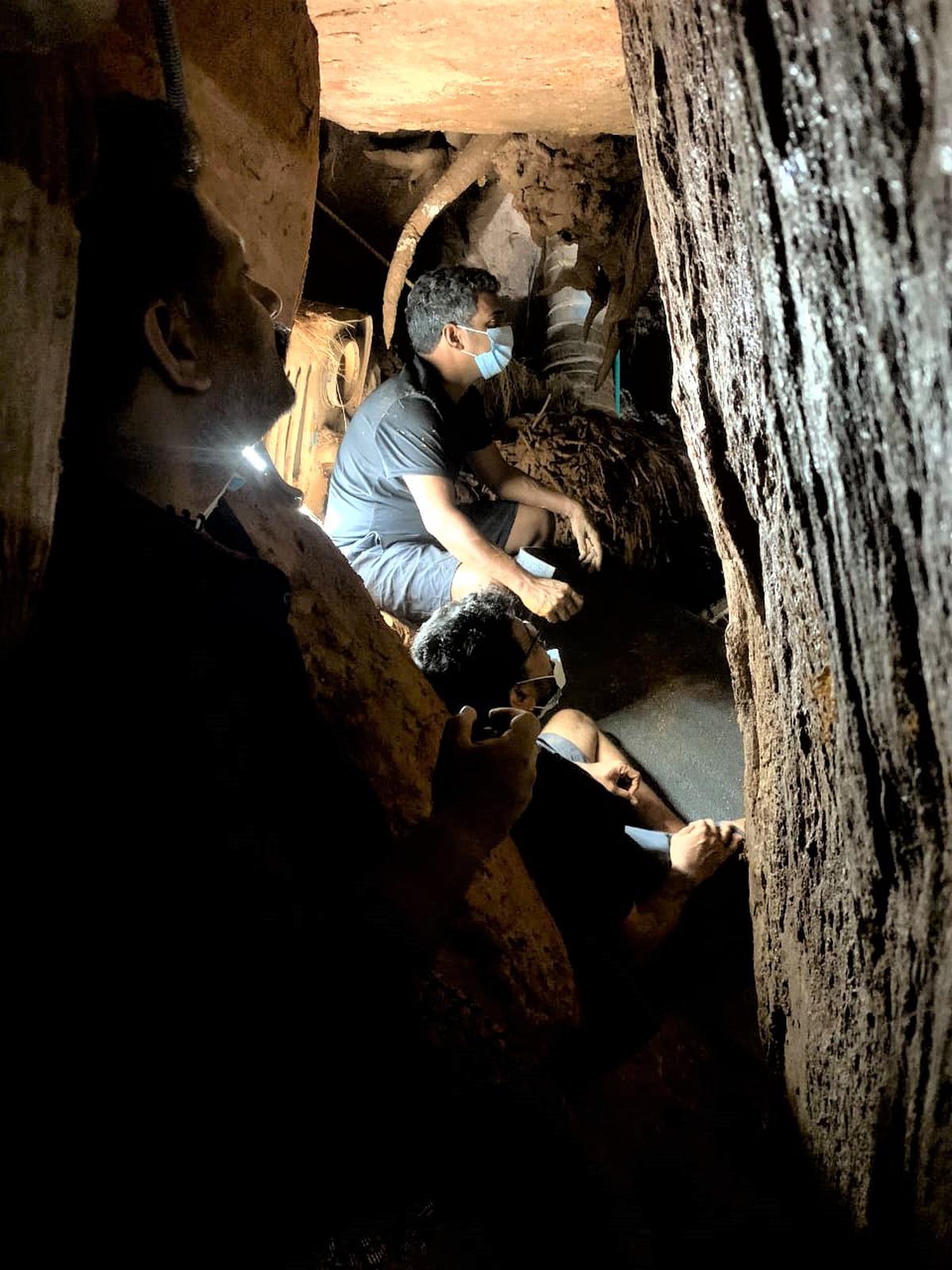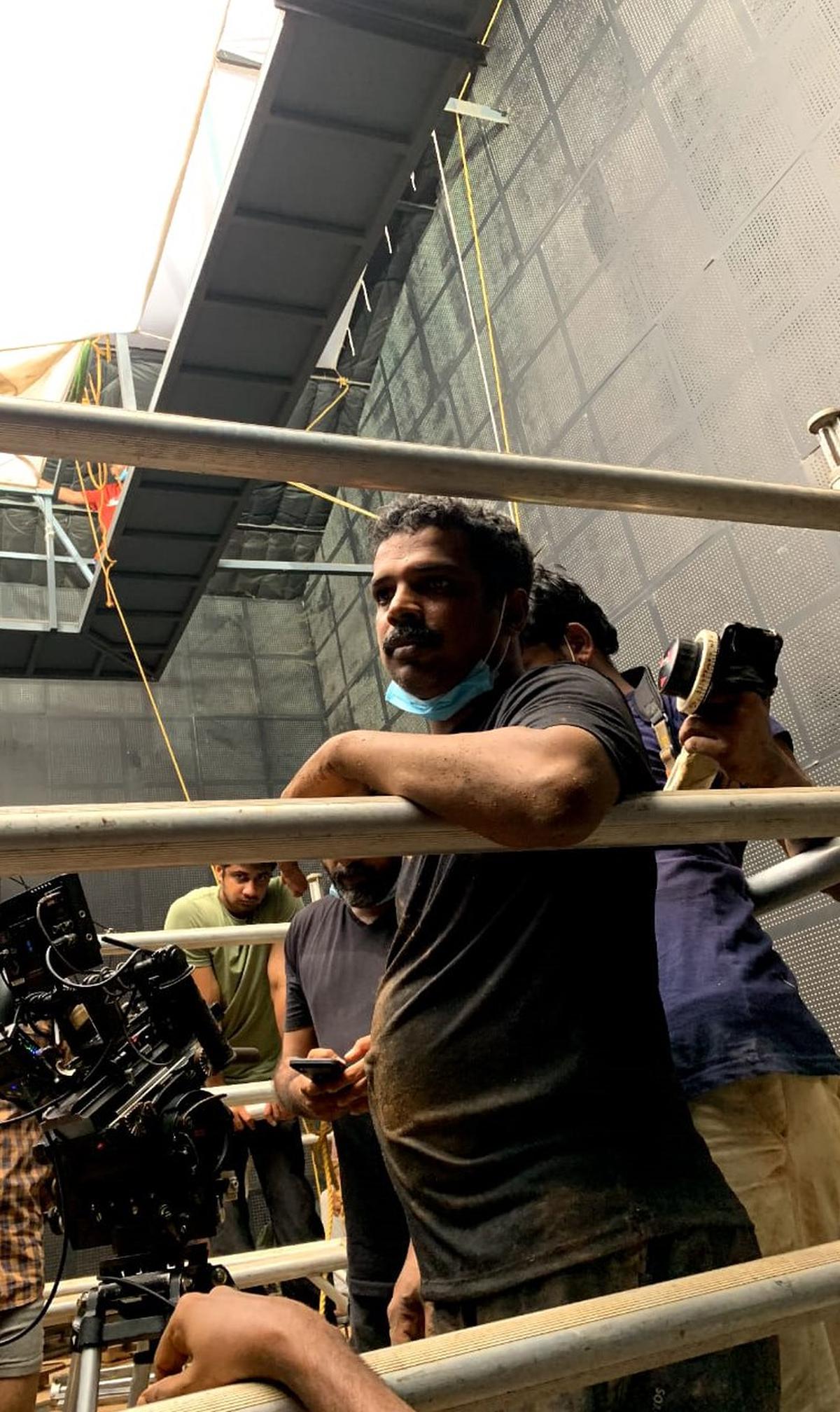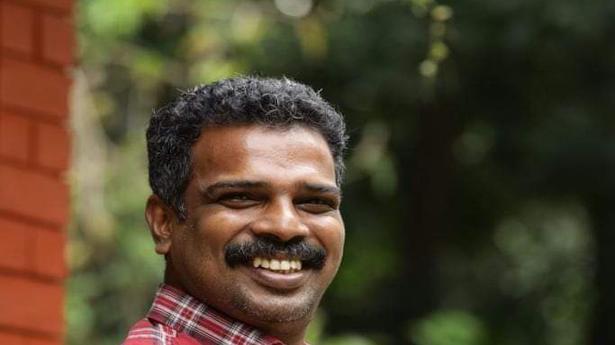Jothish Shankar and team converted a studio floor in Kochi as earth’s interior where Fahadh Faasil’s character is trapped after a landslip
Jothish Shankar and team converted a studio floor in Kochi as earth’s interior where Fahadh Faasil’s character is trapped after a landslip
Art director Jothish Shankar admits that when he came on board Malayankunju, directed by Sajimon, he had no clue what he was getting into. His team had to construct a set that resembled the mud, debris and rubble where the lead character, played by Fahadh Faasil, is trapped after a landslip.
“None of us knew how it would be beneath the soil, in the aftermath of a landslip. So we had marathon discussions and brain-storming sessions that went on for months. It was not easy,” avers Jothish, who is also the production designer of the movie written by Mahesh Narayanan.
Jothish Shankar (right) with Mahesh Narayanan on the location of ‘Malayankunju’
| Photo Credit: SPECIAL ARRANGEMENT
He is relieved that the art work is being discussed and appreciated by critics and the audience. “That happened probably because the behind-the-scenes video was released prior to the movie. It was a conscious decision to do so because otherwise viewers would not have realised that it was a set that we made from scratch. There have been occasions in the past when our hard work went unnoticed because people thought the locations were ‘real’,” say Jothish, recipient of the Kerala State film award for best art direction for Kumbalangi Nights and Android Kunjappan Ver 5.25 in 2019.
Behind the scenes
The set was constructed on a “160 ft long and 80 ft wide” studio floor in Kochi. “We had to imagine what all elements would probably be buried under the earth. We made a miniature version with a cross-section of the soil beneath before proceeding to the actual set. We could have taken the easy way out by using some rocks, water and other elements. But we wanted the audience to feel that the person is actually trapped underground,” he says.
It took one-and-half months for 100-odd people to complete the construction. The set had four portions. One was a lift to shoot the sequence where the character falls down during the landslip. Then they made three tanks, each 40 feet deep. “Inside these tanks were the well that caves in, underground water pipes, the portion where a new-born is stuck, rocks, roots of plants, carcass of animals and birds, and different things on the surface that came crashing down during the landslip, which included a jeep,” he explains. The shoot lasted 24 days. The crew waded through or stood in mud and slush for the shoot.

Fahadh Faasil, Mahesh Narayanan and Jothish Shankar during the shoot of ‘Malayankunju’
| Photo Credit: SPECIAL ARRANGEMENT
Rocks, stones and roots were made with sponge to ensure a safe working environment. There were days when they had to stop the shoot after two or three hours because it was exhausting for the actor and the crew. “We would come up from the tank to take a break and go in again. Fahadh had bruises all over from moving inside the tank.”
Preparations involved
A lot of research went into the process, Jothish adds. “I browsed through videos and photographs of landslip-hit areas and had some 25,000 photographs with me to understand the aftermath of landslips. There were days when things didn’t go as per our plan and I would ask myself why I said yes to the project because I was not sure if the idea would succeed. But I never conveyed my doubts to Saji or Mahesh! However, after a point, I was hell-bent on executing it. I could pull it off only because of teamwork,” he asserts. Amidst all this, the safety of the crew had to be given priority, especially when they had to move through dirty water. “Since it was not possible to stand straight in that space, some crew members had to be seated in a harness.”
Jothish is all praise for Mahesh, who is also the cinematographer of the movie. “It is his first project as a cinematographer and it was his confidence that kept us going. He managed to find the right camera and lens to shoot within so many limitations,” he says.
The team also constructed include Fahadh’s cluttered workspace, the house of the new-born next door and the area hit by the landslip, which is shown towards the climax. “The landslip-affected area was created at Erattupetta. It used to be a rubber plantation,” he says.
An alumnus of Raja Ravi Varma College of Fine Arts, Mavelikkara, where he studied sculpture, Jothish worked as a sculptor before he decided to jump into cinema. “There are no artists in my family. Neither did I know anyone in the film industry. But I wanted to try my luck here,” he says.

Jothish Shankar during the shoot of ‘Malayankunju’
| Photo Credit: SPECIAL ARRANGEMENT
He started out as an assistant to Salu K George in Thanthonni (2010) and his first independent work was Adaminte Makan Abu (2011). He has done over 60 films, notable ones being Thondimuthalum Driksakshiyum, Carbon, Joseph, Lord Livingstone 7000 Kandi, Pathemari, and Aarkkariyam.
Up next for release is Nna Thaan Case Kodu. He is also working in Aashiq Abu’s Neelavelicham, based on Vaikom Muhammed Basheer’s story of the same name.
Jothish stresses that he takes up a project only if he is convinced about executing it, irrespective of the challenges involved. “For example, the dilapidated house in Kumbalangi Nights where the four brothers live was built from scratch. We allowed the moss to grow on the walls to make it look real. In Thondimuthalum Driksakshiyum, we constructed the police station in 13 days. The challenge was that there were real-life cops acting in the movie and we wanted to make it look like a real police station,” he explains.
Before signing off, Jothish says: “My approach to art direction is that it should blend with the subject. It can be a realistic setting or something that I create. The quality of the space plays a huge role in the success of a movie.”







